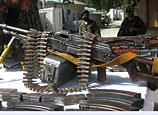
RAMALLAH, July 1 (Xinhua) -- Palestinian National Authority ( PNA) Prime Minister Rami al-Hamdallah called Monday on the United States to put more pressure on the Israeli government to stop what he termed as the Israeli violations that obstruct peace process.
In a meeting held in the West Bank city of Ramallah, Hamdallah told a high-ranking U.S. Congress delegation that the U.S. administration should exert more pressure on Israel "which keeps its daily violations against the Palestinians and keeps occupying their lands and building up settlements."
An official statement issued by Hamdallah's office and emailed to reporters said that Hamdallah told the U.S. congressmen that the Israeli policy "is obstructing all the attempts to achieve a breakthrough in the stalled Middle East peace process."
On Sunday, U.S. Secretary of state John Kerry met with both Palestinian President Mahmoud Abbas and Israeli Prime Minister Benjamin Netanyahu over resuming the stalled peace talks. Kerry said a slight progress was made, but the Palestinians said there was no breakthrough.
"The U.S. efforts shouldn't stop. Its continuation is important in order to release a real peace process in the region," said Hamdallah's statement, adding "but before doing all this, Israel must immediately stop its violations against the Palestinians and their properties."
The direct Israeli-Palestinian peace negotiations stopped in October 2010 after the Israeli government insisted on keeping settlement construction in the West Bank and in east Jerusalem, the part of the city that the Palestinians want to be the capital of their future independent Palestinian state.
"The construction of settlements on the Palestinian lands is the major Israeli action that obstructs and blocks the U.S. efforts to revive the stalled peace process," al-Hamdallah said, adding "while the U.S. is exerting efforts to revive peace, Israel keeps announcing the constructions of more housing units."
Kerry's efforts to revive the stalled Middle East peace began in March this year. He already carried out five rounds of separate talks with the Israelis and the Palestinians, where outstanding issues like the settlements, the recognition of an independent state and the release of prisoners are not resolved yet.
The Palestinians demand Israel immediately halt all settlement activities and recognize the U.S.-backed principle of the two- state solution in accordance to 1967 borders, as well as release more than 100 Palestinian prisoners detained in Israel before Oslo peace accords signed in 1993.
Earlier on Monday, chief Palestinian negotiator Saeb Erekat announced that Kerry will come back to the region in 10 days to follow up his efforts to revive the peace process. He told Voice of Palestine Radio that Kerry has officially informed the Palestinian side that he will be back to the region in 10 days.
"Discussions and debates are still going on... on many issues and subjects," Erekat said, adding "We can't say that there is a progress, and there was also no breakthrough, we want the U.S. efforts to continue in order to resume the peace talks."
On Monday, the Israeli Haaretz Daily reported that during their meeting, Kerry presented to Abbas a new proposal on the resumption of the peace talks. The daily quoted a high-ranking Israeli source as saying that the proposal includes a package of an Israeli goodwill gestures.
Erekat denied the Israeli report and said that Kerry hasn't presented any new plans to President Abbas, adding that "our debates on resolving all the outstanding issues are still going on, mainly the release of prisoners arrested before signing Oslo accords in 1993."
The veteran negotiator accused Israel of obstructing the efforts to revive the peace process that has to be based on ending settlement building, recognizing the principle of the two-state solution and the release of Palestinian prisoners imprisoned in Israeli jails.
"The party which imposes facts on the ground is the party which insists on toppling the efforts of Kerry. We are all exerting our efforts in order to find a solution to all the outstanding issues that we still disagree upon and this is really what we are doing right now," said Erekat.
















 Taiwan's average temperature in June reaches record high
Taiwan's average temperature in June reaches record high


![]()
